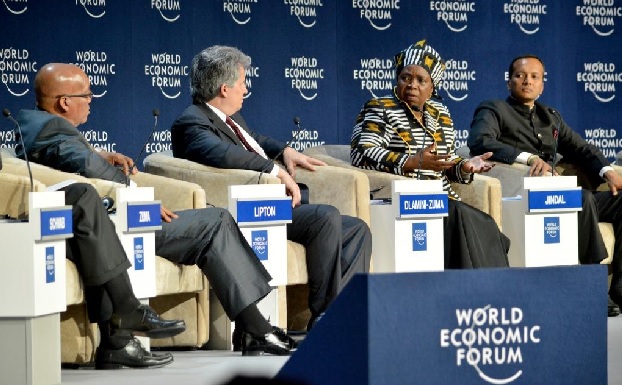Africa will be on the spotlight as business leaders, finance experts and policymakers from the continent and the rest of the world meet in Cape Town, South Africa, for the World Economic Forum (WEF 2015) on Africa, from June 3 to 5 to discuss ways of promoting business on the continent.
With the theme, Then and Now: Re-imagining Africa’s Future, WEF 2015 offers an opportunity for taking stock of progress made over the last 25 years since the Forum first came to Africa in October 1990, as well as “sharing insights on the present landscape” and “identifying innovative approaches” to bring about sustainable development in the future.
More than 1,250 leaders from business, politics, academia, civil society and the media are expected to be attending, which reflects an optimism in the economic prospects of the region, as well as an unprecedented commitment across all stakeholder groups to pursue public-private co-operation as a means of tackling the considerable challenges the region still faces.
“More than 90 senior government officials will attend and 83 leading international companies will be represented, as befits Africa’s youthful population,” said the WEF.
Advertisement
“The meeting will also boast a record 200 young leaders, drawn from the forum’s community of Global Shapers and Forum of Young Global Leaders, as well as the highest proportion of women leaders – at 270 woman leaders 25.8% – than ever before. In total, over 75 countries will be represented.”
Elsie Kanza, head of Africa, WEF, said the occasion of the 25th meeting gives the opportunity to see how far Africa has come economically, socially and politically since 1990.
“However, what this meeting is really about is looking forward, to see how we can channel the lessons of the past with the creativity, innovation and resourcefulness that comes from all stakeholders working together to solve Africa’s challenges in the present and future,” Kanza said.
Advertisement
This year, the programme is built upon three pillars: enabling markets, marshalling resources and inspiring creativity. The meetings will also, for the first time, feature webcast press conferences and issue briefings live, enabling the public to submit questions on important issues facing Africa’s future.
It will feature high-level sessions on critical subjects such as migration, combating terrorism and harnessing Africa’s informal economy, demographic/population growth issues, taxes, conflicts in Africa and the Ebola crisis.
These issues may set the agenda for Adewunmi Adesina, the newly-elected president of the African Development Bank (AfDB) as he seeks to fill the big shoes of the office.
On demographic issues, Winnie Byanyima, executive director, Oxfam International, who is attending the WEF, predicted that Africa’s working-age population is expected to double to one billion in the next 25 years, which is a warning bell for African leaders.
Advertisement
“There is huge potential, but it could also be a demographic bomb – if Africa does not invest in these young people, in their skills and in jobs for them,” she said.
In its examination of Africa’s economic performance and prospects, the African Economic Outlook (AEO), compiled by the African Development Bank (AfDB), the Organisation for Economic Cooperation and Development (OECD) and the UN Development Programme (UNDP), predicts for 2015 that “Africa will soon be closing in on the impressive growth levels seen before the 2008/09 global economic crisis”.
The Overseas Development Institute (ODI) says that increased growth is only part of the answer when seeking to reduce poverty but warns that Inequality and income differences also need to be addressed.
On taxes, Byanyima is hoping to use the networking opportunities at the forum to get her message across to African leaders to adopt a firm position on global corporate tax rules as one way of redressing the balance between “the money lost in unpaid taxes [which is] much more than the total aid coming in to developing countries.”
Advertisement
She said Oxfam had calculated that in 2010 alone, Africa lost 11 billion dollars as a result of tax evasion, citing companies that register in tax havens and then extract and export large quantities of Africa’s natural resources “without paying their fair share of taxes”.
Byanyima spoke of the urgent need for a global tax body that would close existing loopholes. “Our message to the African [and other participants] in Cape Town is: please line up behind a UN reform of the global tax system. Only then can Africa finance all its ambitious sustainable development goals,” she said.
Advertisement
Another factor expected to be discussed at the forum is the number of political unrest and conflicts being fought across the continent, which is affecting Africa’s economic growth.
According to The Stockholm International Peace Research Institute (SIPRI), military spending in Africa increased in 2014, while the African Economic Outlook 2015 noted that “between 2001 and 2014 violent conflict has receded overall and political stability improved – although several economies suffered again, at least temporarily, from political unrest.”
Advertisement
A major cause of political unrest has been the tendency of some African leaders to attempt to stay in office beyond the length of time stipulated in their countries’ constitutions.
In October 2014, President Blaise Campaore of Burkina Faso agreed to step down after an unsuccessful attempt to extend his rule. Most recently, Burundi has been experiencing violent protests as President Pierre Nkurunziza insists he is entitled to run again.
Advertisement
The forum is also expected to raise the issue of corruption in the continent. While corruption and mismanagement are to be found worldwide, there are several blatant examples in Africa which go some way towards answering the question why there is such an unequal distribution of wealth.
According to Transparency International, in its latest report, “corruption has been a key aspect of political and economic structures across a range of West African countries.”
Last but not least is the Ebola Virus Disease (EVD), which battered the economies of Guinea, Liberia and Sierra Leone, killing more than 11,000 people since it broke out over a year ago, and causing economic experts to drastically revise their predictions for West Africa.
Add a comment






